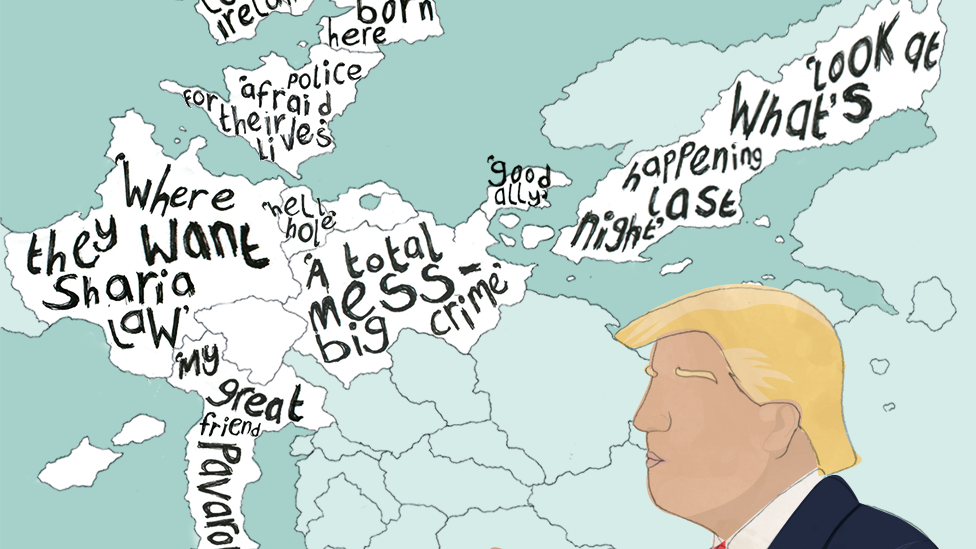Blunt Trump averts diplomatic disaster in Brussels
- Published
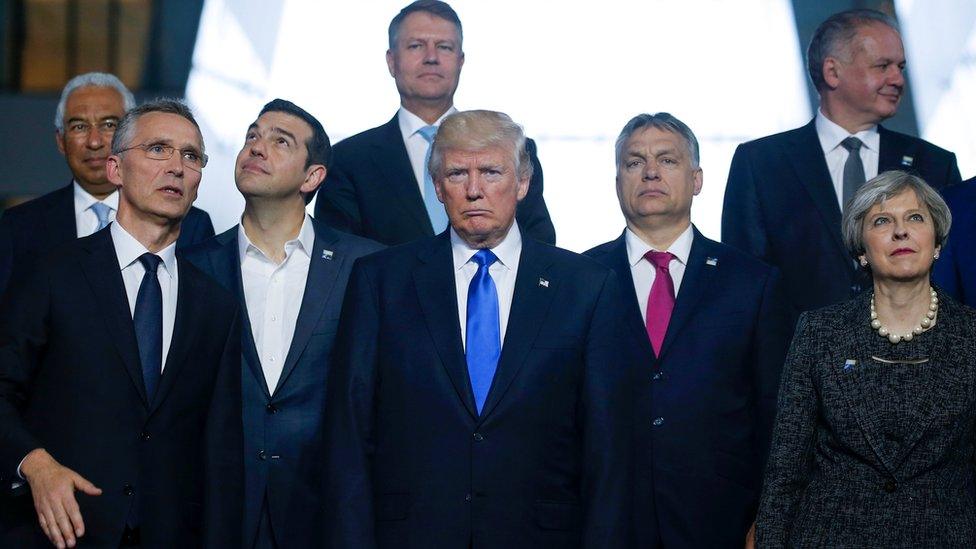
Stern faces but warmer words on Trump's first trip to Nato
Donald Trump's motorcade swept through Brussels on a tour of the landmarks of post-war reconstruction that he once seemed to threaten - and diplomatic calamity was averted.
It may seem strange to measure the impact of a presidential visit to the EU institutions and Nato simply in terms of faux-pas avoided and false steps not taken but somehow that's the way it is for Mr Trump.
The 45th President of the United States found himself immersed for the first time and at first hand in the complexities of the EU.
And he discovered that they have sprinkled the title of president rather liberally among the heads of the European Commission, European Council and European Parliament.
A favourite president?
Even with all those presidential figures on hand in Brussels, it was hard to ignore the feeling that, as European leaders were getting to know the president they must now deal with, they were being offered a tantalising glimpse of the president they preferred.
Whether by coincidence or not, Barack Obama was appearing at around the same time 700km (435 miles) down the road at a huge public event in Berlin.
Mr Obama had an easier day of it than Mr Trump.
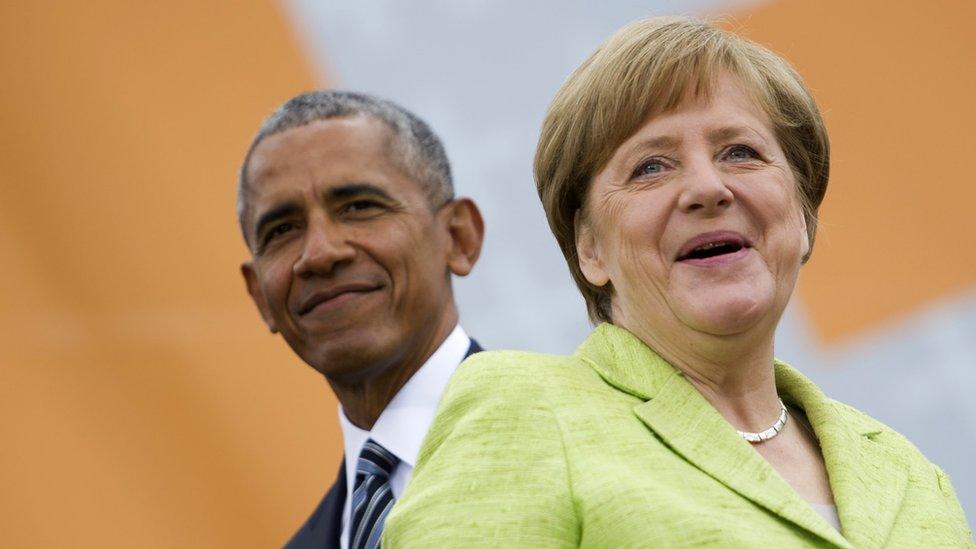
Meanwhile, down the road....
He basked in the admiration of a huge crowd at the Brandenburg Gate alongside Chancellor Angela Merkel where they had gathered for a celebration of the strength of the Evangelical Church.
Mrs Merkel, said Mr Obama, had done great things for Germany and the world - and it may well be the case that his endorsement will still carry a little weight as the chancellor faces elections later in the year.
At around the same time Mr Trump was holding talks with those various European presidents - including Jean-Claude Juncker of the European Commission, who once talked of the need to educate Mr Trump about "the world he does not know".
Scrutinising the body language
No-one took questions after the meeting.
Mr Trump said nothing at all and Donald Tusk from the EU Council confined himself to an on-camera statement in which he alluded to one or two areas where it would be hard to disagree - like the importance of fighting terrorism and shared values like freedom and human dignity - but then said enough to suggest that there were plenty of areas where they had not found it hard to disagree.
"Some issues," he said, "remain open like climate and trade. And I'm not 100% sure we can say today that we have a common position, a common opinion about Russia."
Mr Trump's schedule appeared to have been designed to minimise opportunities for press scrutiny, so there was no chance to ask him directly whether he had changed his views on Brexit, which is viewed as a catastrophe in Brussels but which he has described as both "great" and "fantastic".
A news conference would also have presented the president with an opportunity to examine his evolving attitude towards Nato which he has variously described both as "obsolete" and "no longer obsolete".
In the absence of such scrutiny, some reporters devoted themselves to microscopic observation of the Trump body language.
Donald Trump met new French President Emmanuel Macron for the first time on Thursday
Anyone who followed the discussions during the Middle Eastern section of the tour about whether the first couple were holding hands as they walked in public might care to note that, as they waited at the US embassy residence to greet their lunch guest Emmanuel Macron, they did not stand hand-in-hand but were so close together that their arms were touching.
The rather awkward presidential handshake with Mr Macron is a good example of how that kind of scrutiny works.
It lasted only a little more than five seconds. While it did look rather over-extended, some reporters spoke of "knuckles whitening" and of "faces tightened" and one even described it as "screw-you in handshake form". Watch the video above and judge for yourselves.
Tough words and a firm shove
When President Trump did finally speak in public towards the end of his day in Brussels, it was worth waiting for.
He made a short speech at the magnificent new Nato headquarters building and pointed out rather archly that he had avoided asking how much the palatial new building had cost, even though the alliance's over-reliance on American guns and money is one of his favourite diplomatic themes.
But he did not confine himself to that little joke on the subject.
In a blunt address, he said directly that 23 of the 28 Nato members were not paying their fair share towards its costs and warned that was unfair to the American taxpayer - a remark that will surely resonate back home.
He also conflated very directly the problem of terrorism with the issue of immigration in a way that very few of his fellow Nato leaders would endorse, but which picked up on one of his favourite campaign themes from last year.
In May 2017 Donald Trump pushed aside Montenegro's prime minister and dressed down Nato leaders
Here again, though, it seems that Mr Trump's visit may be remembered not for the big politics or the strategic thought but for another curious moment captured on camera and instantly transmitted by social media.
As the leaders began to group themselves for the formal summit photograph, Mr Trump appeared to emerge from the back of the pack and firmly push out of the way Dusko Markovic, the prime minister of Montenegro - which is about to join the alliance. The American leader is then seen to draw himself to his full height, ready for the picture.
So, certainly no diplomatic disasters on President Trump's first visit to Brussels. He came to give his fellow Nato leaders something to think about and so he did.
But something about the president somehow means that he can't help giving everyone something to talk about at the same time.
- Published25 May 2017
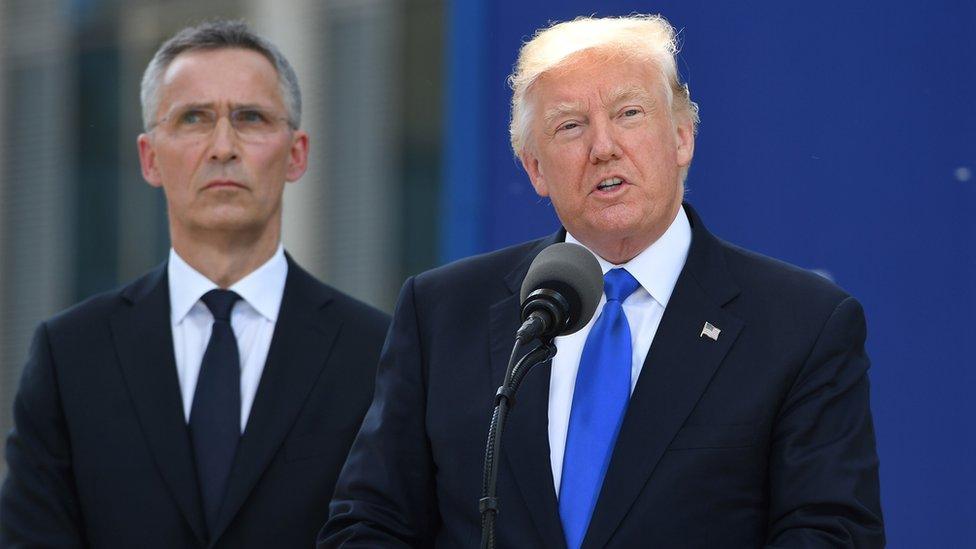
- Published25 May 2017
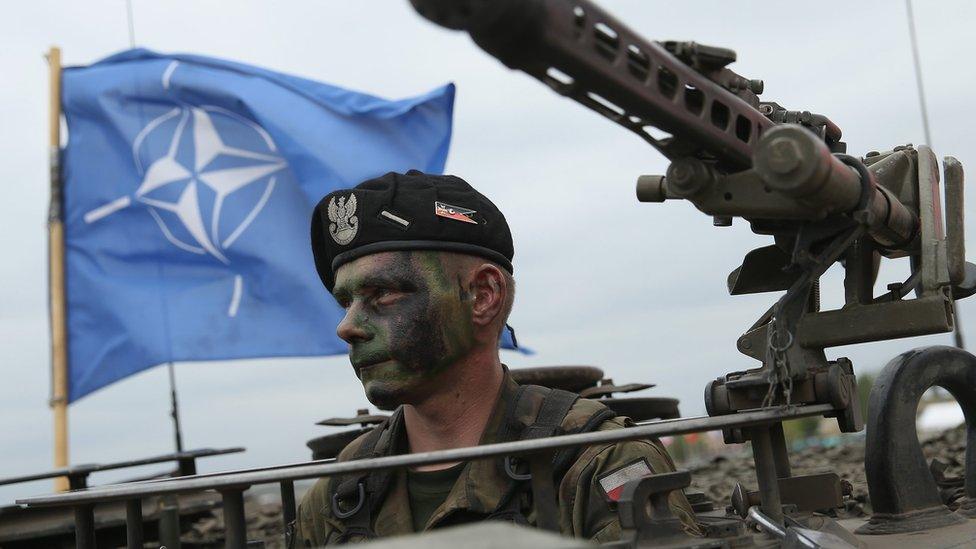
- Published24 May 2017
- Published23 May 2017
